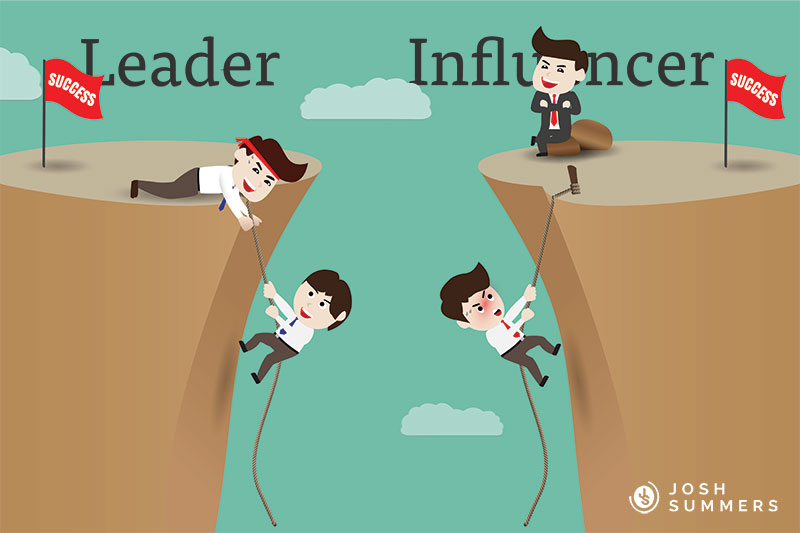In the economy of online marketing, “influence” has become the currency of those in power.
The way to earn this currency is to gain followers, encourage clicks, sign up as “sub-affiliates” and attract as many eyeballs to your content as possible. This currency can then be exchanged for real money in the form of sales, sponsorships, advertisements and brand promotions.

It reminds me of the dot-com bubble, when advertisers were paying unrealistic sums of money for exposure on this new platform called “the web”.
And just like the dot-com bubble, I believe this influencer marketing bubble is eventually going to pop.
Redefining the Term Leader
I remember reading a leadership development book a few years ago that quoted Peter Drucker, a prominent author on leadership in business. He proposed that:
The only definition of a leader is someone who has followers.
Peter Drucker
With due respect to a great author…
…I absolutely disagree.
This may have been true a couple decades ago when it was first written, but in the age of Instagram, Facebook and YouTube…it’s a flat-out lie.
And I can prove it.
How? Ask me how easy it is to buy followers on Instagram. You can Google it yourself, but I’ll go ahead and give you the answer…it’s really easy. It’s entirely possible to buy influence on the internet, but I would argue that real leadership can only be earned.
If social media has taught us anything, it’s this:
A leader is always a person who influences. But an influencer is not always a real leader.
For this reason, I believe that influencer marketing is a fad that is already starting to give way to something I term “leadership marketing”. It’s very similar to what’s been known as “thought leadership” for a while.
It feels like I’m arguing semantics here, so let me provide some real-world examples.
How to Distinguish Leaders from Influencers
In many cases, influencer marketing and leadership marketing look identical on the surface.
And to be clear here, I am obviously biased toward leadership marketing, but that doesn’t mean I believe that influencer marketing is “evil”. It’s just not sustainable, in my opinion.
To distinguish an influencer from a leader, I recommend the following comparisons.
An influencer’s goal is to gain followers — A leader’s goal is to develop their followers.
An influencer wants to sell — A leader wants to teach.
An influencer makes their followers envious — A leader makes their followers inspired.
An influencer is worried about image management — A leader is worried about change management.
In the end, leaders are known for a change they want to make in their followers.

They stand for something. They could write a book on that something. They have climbed at least part way up the hill and can speak with authority from experience.
And because they’ve clearly articulated this identity, people notice and they follow.
The deception of influencer marketing is that you can gain that kind of identity and respect without first putting your stake in the ground and saying “I stand for/believe in this!”
A Note to Influencers & Those Who Aspire to Be One
If you’re reading this and you’re a successful influencer, good for you. I know it can be hard work building an audience, it’s an investment of your time and I hope you can ride that wave and cash in for as long as you can.
But let me warn you: Unless you can use this influence to develop a skill (other than “being an influencer”), a network or a personal mission statement that you stand for, your value will be tied to a specific product (essential oils, anyone?), your beauty, or your ability to entertain.
For those of you reading this who aspire to be influencers, I challenge you to redirect that energy into being a leader. What are you passionate about and how can you strategically use that to influence people to be better?
As for me…
I’m passionate about helping people discover their real identity. That’s what I want to be known for. Maybe I’ll gain a large following from that, maybe not.
The reason I think leadership marketing will overtake influencer marketing is because of this simple truth:
From a marketing perspective, 100 people who follow a leader are more valuable than 10,000 people who follow an influencer.
In business we call it a “conversion rate”.
In life, I consider it the true currency of influence.

Amen. This is a great message. I wish I could sink it in the hearts of our youth. They keep trying to “gain followers” but they keep selling themselves short.
Very true. Much of what social media teaches youth, it seems, is that your identity is tied to what others think of you.
Thought provoking…thanks❣️
I’m glad you thought so! I’m sure I’ll change my tune on some of this as time goes on, but my hope was to just get my initial thoughts written out.
Josh, I just found this blog. And like another blog of yours that I followed for many years in a place far, far away (well, maybe not quite as far away for you as for me!), I look forward to reading many more of your posts!
And yes, I agree, leadership marketing has a LOT more staying power than influencer marketing!
Thanks so much, Mike! I really appreciate you and Wendy 🙂